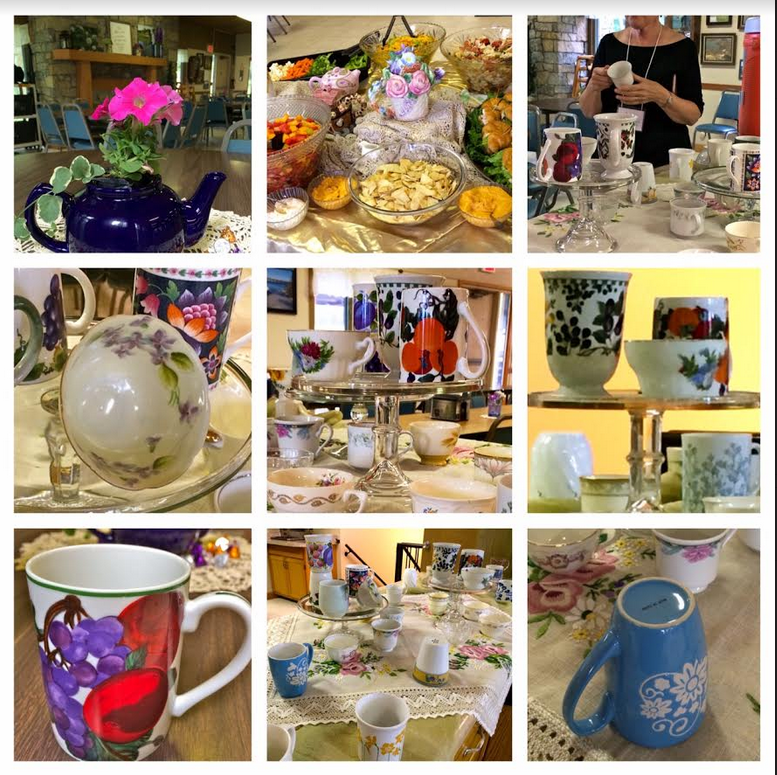Glimpses of Healing and Hope

 June 26, 2017
June 26, 2017
By: Jane Bishop Halteman
Indiana-Michigan Mennonite Conference annual sessions took place June 15-17 at Amigo Centre in Sturgis, MI. My long-time good friend Frances offered a meditation at the women’s tea Friday, bringing back fond memories of more than 20 years ago when the two of us attended summer worship courses at Anabaptist Mennonite Biblical Seminary (AMBS) and subsequently were invited by our suburban Chicago congregation to lead weekly evening worship in a contemplative prayer setting.
The bond of our friendship grew as we fashioned themes, calls to worship, and prayers, crafted visuals, developed handouts, and invited readers and song leaders to join us in bringing the 30-minute services to a small group of faithful worshippers.
Frances once remarked to the church’s office administrator, who observed our sometimes time-consuming set-ups, that getting ready for Wednesday prayer was for us as engaging as playing house is for young children. With the enthusiasm of kids working diligently at being grown-ups, we engaged wholeheartedly with each other and our subject matter to create space for quiet reflection and new awareness of the Divine in our midst.
In preparation for her conference presentation based on Joyce Rupp’s book entitled The Cup of Our Life, Frances collected from a variety of thrift stores 45 unique teacups, some bright, some pastel, some stylized, some delicately floral, some mugs, some closer to actual teacups. As participants filled their plates and found a seat, they also chose a cup to use for personal reflection as Frances shared.
During her after-lunch presentation, she asked us to consider why we selected the cup in front of us. Did we find the color or style appealing? Did the cup remind us of something? What about the cup connected to our lives? My mug, painted with brightly colored, realistically sketched fruits still on the vine with leaves and tendrils apparent, brought to mind the importance of authentic connections and taproot nourishment, so germane to generative living. Not until I sat with my mug at home, however, did that realization surface.
Reminding us that “these are very ordinary cups,” Frances asked what about these simple cups might lead us to reflect on the cup of our lives? “Could the cup be a reminder of spiritual thirst? Our need to fill, drink, empty, wash…?”
Urging her listeners to think of the cup as an image of their own uniqueness, Frances quoted author Rupp as saying, “Too often people want someone else’s spirituality rather than their own. I’ve discovered that the more I am conscious and accepting of God’s love for me, the more I can accept myself and the unique way that my spiritual path unfolds. God created each one of us out of love. We are one-of-a-kind, unique, meant to be a light of love in transforming our world.”
Like the mugs and teacups we chose, our lives are sometimes marred by bumps, scratches, cracks, and chips, Frances pointed out, suggesting that rather than seeing these imperfections as flaws, we might view them as opportunities to nurture “understanding and compassion,” thus enabling change and growth.
Quoting author Rupp once again, Frances suggested that “wholeness implies a process, a gradual coming together into a oneness in which all the parts are integrated, but not necessarily perfect. Wholeness or holiness takes a lifetime of ups and downs. It can never be accomplished apart from divine help and guidance or without the interaction of our lives with others.”
Back in the winter of 2007, I led an adult formation class based on The Cup of Our Life, gathering the chapter-by-chapter overviews below from the Rupp book for the class syllabus; ten years later, I find these snippets helpful to ponder anew and am grateful to Frances for bringing this book to mind once again.
The Cup of Life: What would it be like if we believed we were a love song of the Divine? How would it change our presence with others? While healthy spirituality requires a deep belief in our own loveableness, this belief is not always easy to accept. May we find ways to see ourselves as songs of love, cups full of goodness, bringing life to others.
The Open Cup: As we ponder our openness, what brave steps might we take toward emptying those things that perhaps keep our spiritual cups from being filled? How might uncluttering and making space for listening help prepare us to receive and trust?
The Chipped Cup: How might we look at personal flaws, not to criticize, but to see what they can tell us about our relationship with the Divine and with others. How can we befriend parts of our personality we are reluctant to accept?
The Broken Cup: Brokenness can be an instrument for change. Pain received rightly has the power to transform. What would happen if we met our frustrations, pains, and heartaches as we would meet a visitor having something to teach us? What might we learn from those pieces of our lives that are still wanting and incomplete?
The Cup of Compassion: Sometimes compassion asks us to simply ‘be’ with someone. At other times, compassion asks us to ‘do’ something, to give of our time, to speak out for justice, to go the extra mile. And sometimes compassion asks us to receive graciously from another who has need of our receptivity and our vulnerability.
The Blessing Cup: Each of us can be a blessing. When we bless, it is the deep and vast goodness of the Divine in us that blesses another. When we bless, we touch another with something of the Divine. How have you been blessed by the smiles, loving looks, stories and affirmations, concern and care of others?
